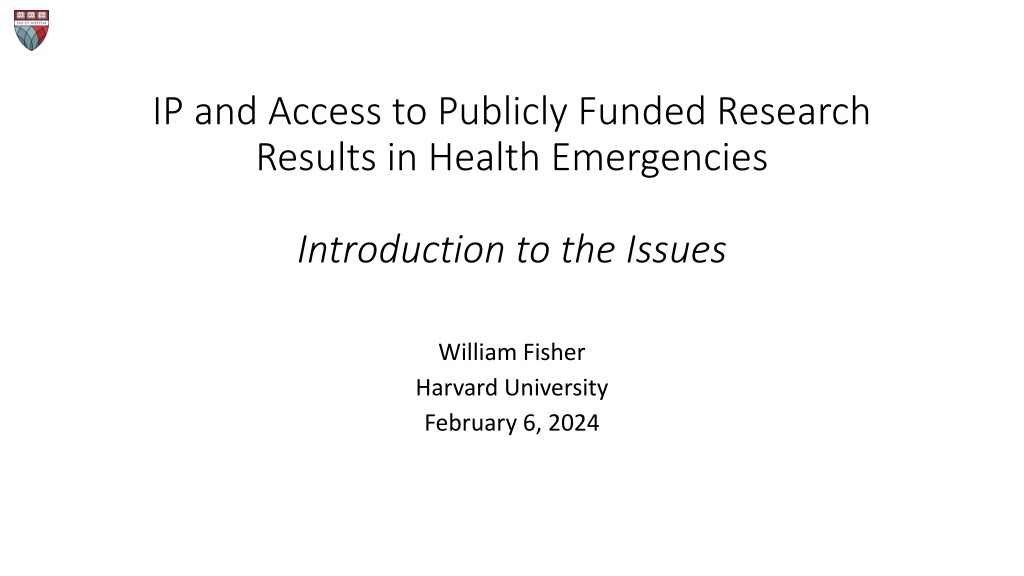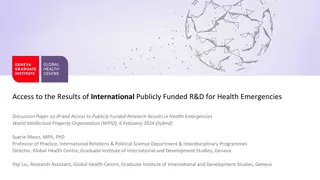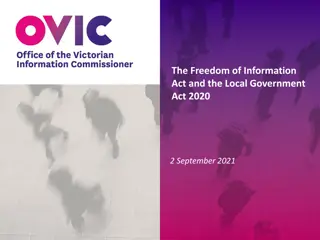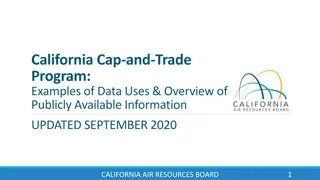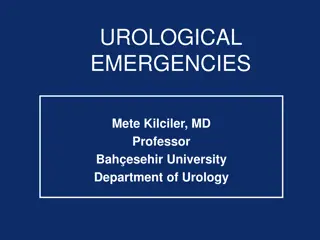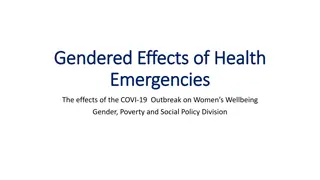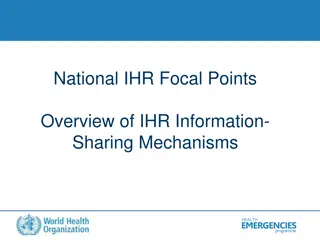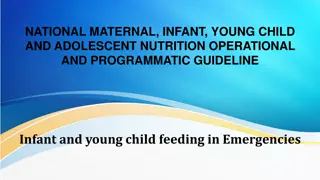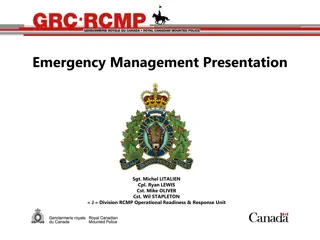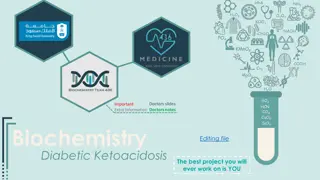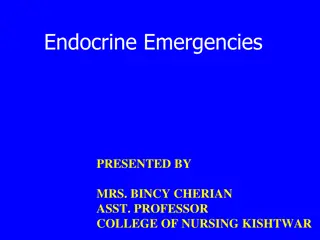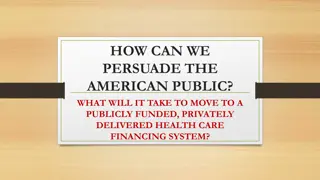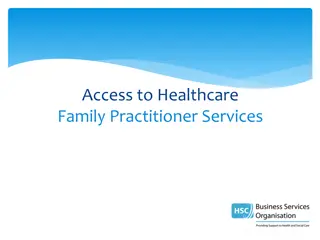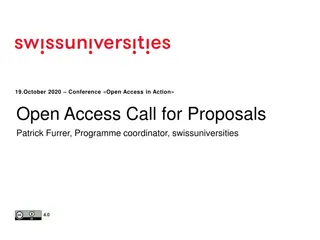Understanding the Access to Publicly Funded Research Results in Health Emergencies
Exploring the intricate relationship between government funding, intellectual property (IP), innovators, licensees, manufacturers, intermediaries, and consumers in the context of producing and distributing vaccines, therapies, and diagnostics during health emergencies.
Download Presentation

Please find below an Image/Link to download the presentation.
The content on the website is provided AS IS for your information and personal use only. It may not be sold, licensed, or shared on other websites without obtaining consent from the author. Download presentation by click this link. If you encounter any issues during the download, it is possible that the publisher has removed the file from their server.
E N D
Presentation Transcript
IP and Access to Publicly Funded Research Results in Health Emergencies Introduction to the Issues William Fisher Harvard University February 6, 2024
Government Funding (grants; prizes; tax relief) Innovator
Government Funding (grants; prizes; tax relief) IP Innovator
Government Funding (grants; prizes; tax relief) IP Innovator license Licensee (manufacturer)
Government Funding (grants; prizes; tax relief) IP Innovator license License fees Licensee (manufacturer)
Government Funding (grants; prizes; tax relief) IP Innovator license License fees Licensee (manufacturer) products Intermediaries Consumers (Patients)
Government Funding (grants; prizes; tax relief) IP Innovator license License fees Licensee (manufacturer) products Intermediaries $ Consumers (Patients)
Government Funding (grants; prizes; tax relief) IP Innovator license Follow-on innovator License fees Licensee (manufacturer) products Intermediaries $ Consumers (Patients)
Government Funding (grants; prizes; tax relief) IP Innovator license Follow-on innovator License fees Licensee (manufacturer) products products Intermediaries Intermediaries $ $ Consumers (Patients) Consumers (Patients)
Government Funding (grants; prizes; tax relief) IP Innovator license Follow-on innovator License fees Licensee (manufacturer) vaccines, therapies, diagnostics products Intermediaries Intermediaries $ $ Consumers (Patients) Consumers (Patients)
Government Funding (grants; prizes; tax relief) IP Innovator license Follow-on innovator License fees Licensee (manufacturer) vaccines, therapies, diagnostics products Dysfunctions during Health emergencies Include: Intermediaries Intermediaries $ $ Consumers (Patients) Consumers (Patients)
Government Funding (grants; prizes; tax relief) IP Innovator license Follow-on innovator License fees Licensee (manufacturer) vaccines, therapies, diagnostics products Dysfunctions during Health emergencies Include: Intermediaries $ Intermediaries $ Consumers (Patients) Consumers (Patients)
Government Funding (grants; prizes; tax relief) IP Innovator license Follow-on innovator License fees Licensee (manufacturer) vaccines, therapies, diagnostics products Dysfunctions during Health emergencies Include: Intermediaries $ Intermediaries $ Consumers (Patients) Consumers (Patients) geographic restrictions
Government Funding (grants; prizes; tax relief) IP Innovator license Follow-on innovator License fees Licensee (manufacturer) vaccines, therapies, diagnostics products Dysfunctions during Health emergencies Include: Intermediaries $ Intermediaries $ Consumers (Patients) Consumers (Patients) geographic restrictions
Government Funding (grants; prizes; tax relief) IP Innovator license Follow-on innovator License fees Licensee (manufacturer) vaccines, therapies, diagnostics misalignment between products and threats products Dysfunctions during Health emergencies Include: Intermediaries $ Intermediaries $ Consumers (Patients) Consumers (Patients) geographic restrictions
Government Funding (grants; prizes; tax relief) IP Innovator license Follow-on innovator License fees Licensee (manufacturer) vaccines, therapies, diagnostics products Intermediaries Intermediaries $ $ Consumers (Patients) Consumers (Patients)
Issue #1: Should publicly funded private Innovators be permitted to acquire IP rights? Government Funding (grants; prizes; tax relief) IP Innovator license Follow-on innovator License fees Licensee (manufacturer) vaccines, therapies, diagnostics products Intermediaries Intermediaries $ $ Consumers (Patients) Consumers (Patients)
The Debate Over IP Rights on Publicly Funded Innovations Justifications Optimize commercialization of funded discoveries Criticisms Forces the public to pay twice Strategic behavior by university TTOs undermines, not advances, goal of optimizing use of funded discoveries Most of the licenses granted by universities to firms are non-exclusive Little evidence of impact of university royalty sharing policies on inventive activity by faculty or faculty mobility Deflects academic science from proper job: basic science At most, justifies patenting in other countries, not in US Causes most universities to waste resources on TTOs Incentivize additional research by university scientists Internalization theory (Hemel & Ouellette 2017) Increase revenues of universities
The Debate Over IP Rights on Publicly Funded Innovations Justifications Optimize commercialization of funded discoveries Criticisms Forces the public to pay twice Strategic behavior by university TTOs undermines, not advances, goal of optimizing use of funded discoveries Most of the licenses granted by universities to firms are non-exclusive Little evidence of impact of university royalty sharing policies on inventive activity by faculty or faculty mobility Deflects academic science from proper job: basic science At most, justifies patenting in other countries, not in US Causes most universities to waste resources on TTOs Incentivize additional research by university scientists Internalization theory (Hemel & Ouellette 2017) Increase revenues of universities
The Debate Over IP Rights on Publicly Funded Innovations Justifications Optimize commercialization of funded discoveries Criticisms Forces the public to pay twice Strategic behavior by university TTOs undermines, not advances, goal of optimizing use of funded discoveries Most of the licenses granted by universities to firms are non-exclusive Little evidence of impact of university royalty sharing policies on inventive activity by faculty or faculty mobility Deflects academic science from proper job: basic science At most, justifies patenting in other countries, not in US Causes most universities to waste resources on TTOs Incentivize additional research by university scientists Internalization theory (Hemel & Ouellette 2017) Increase revenues of universities
The Debate Over IP Rights on Publicly Funded Innovations Justifications Optimize commercialization of funded discoveries Criticisms Forces the public to pay twice Strategic behavior by university TTOs undermines, not advances, goal of optimizing use of funded discoveries Most of the licenses granted by universities to firms are non-exclusive Little evidence of impact of university royalty sharing policies on inventive activity by faculty or faculty mobility Deflects academic science from proper job: basic science At most, justifies patenting in other countries, not in US Causes most universities to waste resources on TTOs Incentivize additional research by university scientists Internalization theory (Hemel & Ouellette 2017) Increase revenues of universities
The Debate Over IP Rights on Publicly Funded Innovations Justifications Optimize commercialization of funded discoveries Criticisms Forces the public to pay twice Strategic behavior by university TTOs undermines, not advances, goal of optimizing use of funded discoveries Most of the licenses granted by universities to firms are non-exclusive Little evidence of impact of university royalty sharing policies on inventive activity by faculty or faculty mobility Deflects academic science from proper job: basic science At most, justifies patenting in other countries, not in US Causes most universities to waste resources on TTOs Incentivize additional research by university scientists Internalization theory (Hemel & Ouellette 2017) Increase revenues of universities
The Debate Over IP Rights on Publicly Funded Innovations Justifications Optimize commercialization of funded discoveries Criticisms Forces the public to pay twice Strategic behavior by university TTOs undermines, not advances, goal of optimizing use of funded discoveries Most of the licenses granted by universities to firms are non-exclusive Little evidence of impact of university royalty sharing policies on inventive activity by faculty or faculty mobility Deflects academic science from proper job: basic science At most, justifies patenting in other countries, not in US Causes most universities to waste resources on TTOs Incentivize additional research by university scientists Internalization theory (Hemel & Ouellette 2017) Increase revenues of universities
The Debate Over IP Rights on Publicly Funded Innovations Justifications Optimize commercialization of funded discoveries Criticisms Forces the public to pay twice Strategic behavior by university TTOs undermines, not advances, goal of optimizing use of funded discoveries Most of the licenses granted by universities to firms are non-exclusive Little evidence of impact of university royalty sharing policies on inventive activity by faculty or faculty mobility Deflects academic science from proper job: basic science At most, justifies patenting in other countries, not domestic patenting Causes most universities to waste resources on TTOs Incentivize additional research by university scientists Internalization theory (Hemel & Ouellette 2017) Increase revenues of universities
The Debate Over IP Rights on Publicly Funded Innovations Justifications Optimize commercialization of funded discoveries Criticisms Forces the public to pay twice Strategic behavior by university TTOs undermines, not advances, goal of optimizing use of funded discoveries Most of the licenses granted by universities to firms are non-exclusive Little evidence of impact of university royalty sharing policies on inventive activity by faculty or faculty mobility Deflects academic science from proper job: basic science At most, justifies patenting in other countries, not domestic patenting Causes most universities to waste resources on TTOs Incentivize additional research by university scientists Internalization theory (Hemel & Ouellette 2017) Increase revenues of universities
Issue #1: Should publicly funded private Innovators be permitted to acquire IP rights? Government Funding (grants; prizes; tax relief) IP Innovator license Follow-on innovator License fees Licensee (manufacturer) vaccines, therapies, diagnostics products Intermediaries Intermediaries $ $ Consumers (Patients) Consumers (Patients)
Issue #2: Should dysfunctions associated with exercise of those rights be curbed through conditions on the funding? Government Funding (grants; prizes; tax relief) IP Innovator license Follow-on innovator License fees Licensee (manufacturer) vaccines, therapies, diagnostics products Intermediaries Intermediaries $ $ Consumers (Patients) Consumers (Patients)
Issue #2: Should dysfunctions associated with exercise of those rights be curbed through conditions on the funding? Government 1. shop right Funding (grants; prizes; tax relief) IP Innovator license Follow-on innovator License fees Licensee (manufacturer) vaccines, therapies, diagnostics products Intermediaries Intermediaries $ $ Consumers (Patients) Consumers (Patients)
Issue #2: Should dysfunctions associated with exercise of those rights be curbed through conditions on the funding? Government 1. shop right Funding (grants; prizes; tax relief) IP Innovator license Follow-on innovator License fees Licensee (manufacturer) vaccines, therapies, diagnostics products 2. Duty to make products available at affordable prices -- a. within LMICs, b. within the nation, or c. globally Intermediaries Intermediaries $ $ Consumers (Patients) Consumers (Patients)
Issue #2: Should dysfunctions associated with exercise of those rights be curbed through conditions on the funding? Government 1. shop right Funding (grants; prizes; tax relief) IP Innovator license Follow-on innovator License fees Licensee (manufacturer) vaccines, therapies, diagnostics products 2. Duty to make products available at affordable prices -- a. within LMICs, b. within the nation, or c. globally Intermediaries Intermediaries $ $ Consumers (Patients) Consumers (Patients)
Issue #2: Should dysfunctions associated with exercise of those rights be curbed through conditions on the funding? Government 1. shop right Funding (grants; prizes; tax relief) IP Innovator 3. March-in Rights license Follow-on innovator License fees Licensee (manufacturer) vaccines, therapies, diagnostics products 2. Duty to make products available at affordable prices -- a. within LMICs, b. within the nation, or c. globally Intermediaries Intermediaries $ $ Consumers (Patients) Consumers (Patients)
Issue #2: Should dysfunctions associated with exercise of those rights be curbed through conditions on the funding? Government 1. shop right Funding (grants; prizes; tax relief) IP Innovator 3. March-in Rights license Follow-on innovator license License fees Licensee (manufacturer) Licensee (manufacturer) vaccines, therapies, diagnostics products 2. Duty to make products available at affordable prices -- a. within LMICs, b. within the nation, or c. globally Intermediaries Intermediaries $ $ Consumers (Patients) Consumers (Patients)
Issue #2: Should dysfunctions associated with exercise of those rights be curbed through conditions on the funding? Government 1. shop right Funding (grants; prizes; tax relief) IP Innovator 3. March-in Rights license Follow-on innovator license License fees Licensee (manufacturer) Licensee (manufacturer) vaccines, therapies, diagnostics products 2. Duty to make products available at affordable prices -- a. within LMICs, b. within the nation, or c. globally products Intermediaries Intermediaries Intermediaries $ $ $ Consumers (Patients) Consumers (Patients) Consumers (Patients)
Issue #2: Should dysfunctions associated with exercise of those rights be curbed through conditions on the funding? Government 1. shop right Funding (grants; prizes; tax relief) IP Innovator 3. March-in Rights license Follow-on innovator license License fees Licensee (manufacturer) Licensee (manufacturer) vaccines, therapies, diagnostics products 2. Duty to make products available at affordable prices -- a. within LMICs, b. within the nation, or c. globally products Intermediaries Intermediaries Intermediaries $ $ $ Consumers (Patients) Consumers (Patients) Consumers (Patients)
Issue #3: If so, how should such conditions be implemented? Government 1. shop right Funding (grants; prizes; tax relief) IP Innovator 3. March-in Rights license Follow-on innovator license License fees Licensee (manufacturer) Licensee (manufacturer) vaccines, therapies, diagnostics products 2. Duty to make products available at affordable prices -- a. within LMICs, b. within the nation, or c. globally products Intermediaries Intermediaries Intermediaries $ $ $ Consumers (Patients) Consumers (Patients) Consumers (Patients)
Implementation Options (Prospective) Conditions mandatory in all grants (typically imposed through legislation or administrative rule-making) Default conditions Conditions inserted in individual grants
Implementation Options (Prospective) Conditions mandatory in all grants (typically imposed through legislation or administrative rule-making) Default conditions Conditions inserted in individual grants
Issue #3: If so, how should such conditions be implemented? Government 1. shop right Funding (grants; prizes; tax relief) IP Innovator 3. March-in Rights license Follow-on innovator license License fees Licensee (manufacturer) Licensee (manufacturer) vaccines, therapies, diagnostics products 2. Duty to make products available at affordable prices -- a. within LMICs, b. within the nation, or c. globally products Intermediaries Intermediaries Intermediaries $ $ $ Consumers (Patients) Consumers (Patients) Consumers (Patients)
Issue #4: Are there other ways of efficiently increasing the social benefits of publicly funded Innovation? Government 1. shop right Funding (grants; prizes; tax relief) IP Innovator 3. March-in Rights license Follow-on innovator license License fees Licensee (manufacturer) Licensee (manufacturer) vaccines, therapies, diagnostics products 2. Duty to make products available at affordable prices -- a. within LMICs, b. within the nation, or c. globally products Intermediaries Intermediaries Intermediaries $ $ $ Consumers (Patients) Consumers (Patients) Consumers (Patients)
Summary 1) Should publicly funded private Innovators be permitted to acquire IP rights? 2) If so, should the dysfunctions associated with exercise of those rights be curbed through conditions on the funding? 3) If so, how should such conditions be implemented? 4) Are there other ways of efficiently increasing the social benefits of publicly funded innovation in the context of health emergencies?
